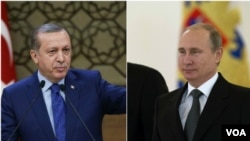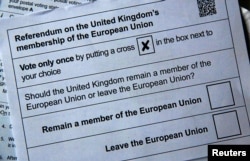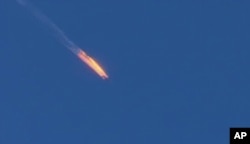The agreement between Russia’s President Vladimir Putin and Turkey’s President Recep Tayyp Erdogan to hold talks on restoring travel and trade ties was made possible by Erdogan’s expression of regret for the downing of a Russian fighter jet along Turkey's border with Syria last November.
The downing of the Russian Su-24, which Ankara claims crossed into Turkish airspace despite repeated warnings, killed it pilot and led to fears of war. Turkey is a member of NATO.
Each side blamed the other for the incident, and insults and threats were exchanged. Russia then stationed long-distance missiles in the region and banned tourism to Turkey and imports of Turkish goods.
But while military and economic concerns played a role, Erdogan’s motivation for breaking the ice with Putin was, according to Ilshat Saetov, director of the Center for the Study of Modern Turkey in Moscow, more influenced by Britain’s vote last week to leave the European Union.
“I assumed that before the (Turkish) referendum on the introduction of the ‘super presidential system', Erdogan wouldn't apologize as the confrontation with Russia gave him a boost in supporters,” Saetov said via e-mail. “However, apparently another referendum on the other end of Europe has brought about the changes."
'I apologize'
The Kremlin initially quoted Erdogan as saying "I apologize" in his letter to Putin about the November downing of the Russian jet, but later changed that to "excuse us."
The British referendum voting to leave the EU, known as the Brexit, made Turkey’s pathway to becoming a member of Europe’s 28-member bloc more complicated, Saetov said.
“They have made it virtually impossible for Turkey to join it given the strained relations with Germany and Turkey's non-observation of many Copenhagen criteria (rules to determine EU member eligibility),” Saetov said. “With the help of the migrant ‘baton’ and blackmail, the issue is not resolved. So Erdogan must look for other directions in foreign-policy cooperation."
Sergey Balmasov, an expert with the Institute of the Middle East and the Russian International Affairs Council, said Erdogan's detente with Russia is a trial balloon, and not just with Moscow.
“His course towards (the) EU continues to be as follows: ‘Admit us on our own conditions,' " Balmasov said. "To some extent he intimidates Brussels, meaning that otherwise he'll join Russia."
The Russian and Turkish foreign ministers are to meet in Sochi, Russia, on July 1, while the presidents agreed to hold a meeting face-to-face at the China G-20 summit in September.
Russian officials say trade and tourism ties could be restored within days, giving Turkey -- and Erdogan -- a needed boost.
“The Turkish economy, despite a slight increase, is not in the best condition,” Saetov said. “Russian sanctions, especially in the field of tourism, made a very sensitive impact on it."
Major sticking point
But while economic ties are easily restored, the conflict in Syria remains the major sticking point for the two leaders. Russia’s military continues to support Damascus, while Turkey supports those fighting against it.
“Neither wishes to lose in Syria and that works towards continuity of tensions between them as these leaders rely on exactly the opposite forces,” Balmasov said. “It was the Syrian issue that served the real cause of their quarrel in 2015."
After the letter to Putin was sent, Ankara first indicated it would pay compensation for shooting down the Russian jet, but quickly recanted.
“Erdogan is trying to walk on a sharp blade, without turning his own electorate against him,” Saetov said. “The foreign policy of Turkey, unfortunately, is almost completely dependent on the internal agenda and the main goal of Erdogan is to become ‘super president.'This is the first reason to treat his regime with great caution."






